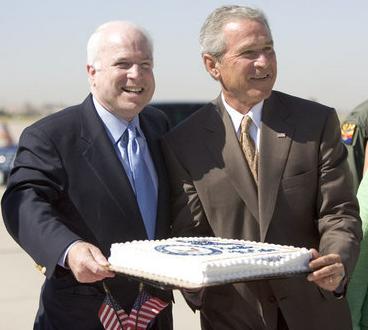[page 54-55] "Wherever we find any large element of individual freedom, some measure of progress in the material comforts at the disposal of ordinary citizens, and widespread hope of further progress in the future, there we also find that economic activity is organized mainly through the free market. Wherever the state undertakes to control in detail the economic activities of its citizens, wherever, that is, detailed central economic planning reigns, there ordinary citizens are in political fetters, have a low standard of living, and have little power to control their own destiny. The state may prosper and produce impressive monuments. Privileged classes may enjoy a full measure of material comforts. But ordinary citizens are instruments to be used for the state's purposes, receiving no more than is necessary to keep them docile and reasonably productive.
 "The most obvious example is the contrast between East and West Germany . . . One hour in East Berlin is enough to understand why the authorities put up the wall."
"The most obvious example is the contrast between East and West Germany . . . One hour in East Berlin is enough to understand why the authorities put up the wall."[page 64] "The United States remains a predominantly free country--one of the freest major countries in the world. However, in the words of Abraham Lincoln's famous 'House Divided' speech, 'A house divided against itself cannot stand . . . I do not expect the house to fall, but I do expect it will cease to be divided. It will become all one thing or all the other.' He was talking about human slavery. His prophetic words apply equally to government intervention into the economy. Were it to go much further, our divided house would fall on the collectivist side. . . . "
Free to Choose: a personal statement
by Milton and Rose Friedman (1980, 1979)
A House Divided
If we could first know where we are, and whither we are tending, we could better judge what to do and how to do it.
We are now far into the ninth decade, since socialist policies were initiated, with the avowed object, and confident promise, of putting an end to our system of free enterprise.
In spite of the operation of those policies, that free enterprise has not only not ceased, but has constantly augmented.
In my opinion, it will not cease, until a crisis shall have been reached, and passed--
"A house divided against itself cannot stand."
I believe this government cannot endure, permanently half collectivist and half free.
I do not expect the Union, or the Constitution, to be dissolved--I do not expect the house to fall--but I do expect it will cease to be divided. It will become all one thing, or all the other.Either the opponents of collectivism, will arrest the further spread of it, and place it where the public mind shall rest in the belief that it is in course of ultimate extinction; or its advocates will push it forward, till it shall become alike lawful in all the States .. . .
Have we no tendency to the latter condition?
Let anyone who doubts, carefully contemplate that now almost complete legal combination--piece of machinery so to speak--compounded of the urge to nationalize one industry after another and the recent list of Bailout, Stimulus, and Reform bills.
Let him consider not only what work the machinery is adapted to do, and how well adapted; but also, let him study the history of its construction, and trace, if he can, or rather fail, if he can, to trace the evidences of design, and concert of action, among its chief bosses, from the beginning.The incumbent Republican legislators hold that they may rightfully be wiser to-day than they were yesterday--that they may rightfully change when they find themselves wrong.
But can we run ahead, and infer that they will make any particular change, of which they, themselves, have given no intimation?
Can we safely base our action upon any of their vague inferences?
Now, as ever, I do not wish to misrepresent their position, question their motives, or do aught that can be personally offensive to them.Whenever, if ever, they and we can come together on principle so that our great cause may have assistance from their great ability, I hope to have interposed no adventitious obstacle.
Our cause then, must be intrusted to, and conducted by its own undoubted friends--those whose hands are free, whose hearts are in the work--and who do care for the result.
In 1980, the Conservatives of the nation turned out Jimmy Carter and again in 1994 we turned out the liberal Democrats in Congress.
We did this under the single impulse of resistance to a common danger, with every external circumstance and media outlet against us.
Of strange, discordant, and even, hostile elements, we gathered from the four winds, and formed and fought the battle through, under the constant hot fire of a disciplined, proud, and pampered enemy.
Did we brave all then to falter now? --now--when that same enemy is wavering, dissevered, and belligerent?
The result is not doubtful. We shall not fail--if we stand firm, we shall not fail.
Wise counsels may accelerate or mistakes delay it, but sooner or later the victory is sure to come.
[adapted by the American Reader from A House Divided: speech delivered at Springfield, Illinois, at the close of the Republican State Convention, June 16, 1858, by Abraham Lincoln. With this speech, Lincoln accepted the nomination of his party for the U.S. Senate seat, then held by Stephen A. Douglas.]
Yes We Can!
"Just how President Roosevelt and his advisers hope to lift the exploited and oppressed out of the mire by increasing profits and raising the cost of living is too deep for me. If they believe employers will increase wages as their profits increase, then they believe the leopard can change his spots. They should know that increased profits only increase the appetite for profits. The desire for the accumulation of great wealth seems like a disease, and disease has never been cured by increasing its virulence. . . . [T]he one lasting solution is the end of the profit system."
It Can Be Done,
by James H. Maurer (1938)


No comments:
Post a Comment